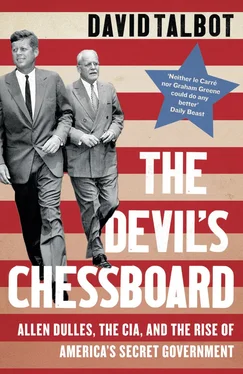Not much more than a year out of college, Joan seemed well on her way to fulfilling her mother’s hopes of creating a bold life for herself. She had studied international law and relations at Radcliffe, and she seemed well positioned to follow her aunt’s pioneering path as a female diplomat, or even her father’s as a legendary spy. She could speak French and German and was learning Russian, a language that she particularly loved, finding it “ just like music.”
But Allen Dulles had other plans for his daughter.
While Joan was living in Vienna, her father introduced her to one of his young agents from the war, a well-born and well-connected Austrian named Fritz Molden. The son of a prominent newspaper editor and a widely respected author and poet, Molden and his family had suffered cruelly at the hands of the Gestapo during the war. After escaping from a Wehrmacht punishment battalion on the eastern front that he had been forced to join, Molden took up with the Austrian resistance, where he was put in touch with Dulles. Molden grew attached to Dulles, though the spymaster kept asking the young man to “ prove himself” by risking his life for him. After the war, the Communists accused Molden of continuing to work as a paid agent for Dulles, but he denied it.
When Joan and Fritz married in spring 1948, it was clearly a marriage of convenience—for Joan’s father and her new husband. Molden, who became secretary to Austrian foreign minister Karl Gruber after the war and later an influential journalist and diplomat, was a vital intelligence connection for Dulles. The marriage was also a wise move for Molden. For the young, ambitious Austrian, having Allen Dulles as a father-in-law was obviously a big feather in his cap. But the match proved much less successful for Joan.
Just like her mother many years before, Joan had great difficulty explaining why she had married her husband. Joan suffered the same severe pre-wedding doubts that Clover had before marrying Allen. Joan found Fritz a “ very erratic character, always given to creating dramatic situations,” as she later wrote her mother. She worried about marrying “someone who wasn’t ever satisfied with the simple everyday aspects of life.” But, in the end, Joan gave in to the implacable intensity of her suitor and went through with the marriage, resigning herself to the fact that she would never have children or enjoy a stable family life with such a man.
Her marriage to Molden, who openly reveled in the company of other women, soon developed a striking resemblance to that of her parents. He often disappeared on mysterious rendezvous, leaving her to wonder when she would see him again.
“Fritz was a ladies’ man, that’s for sure,” Joan recalled years later. “He was so extroverted that you just never knew where he was. He’d say, ‘Let’s rent a sailing ship in the Greek islands,’ and I didn’t know how many of his girlfriends would be on board or for how long we’d be at sea. Do I see similarities with my father? Probably, probably.”
Joan divorced Molden in 1954, but, as if to not disappoint her father, she quickly replaced him with another high-ranking Austrian diplomat named Eugen Buresch. The son of a former Austrian chancellor, Buresch had succeeded Molden as director of the Austrian Information Service in New York. The following year, after being named Austria’s ambassador to Iran, Buresch took Joan off to Tehran, another highly sensitive diplomatic posting. Joan suddenly found herself amid the imperial splendor of Shah Mohammad Reza Pahlavi’s court, the emperor reinstalled on the Peacock Throne by her father, after the CIA overthrew Iran’s democratically elected government in 1953.
Joan gave birth to two children with Buresch, a boy and girl. Like Fritz Molden, Joan’s second choice for a husband seemed crafted primarily for her father’s professional benefit. Iran was not only an oil-rich nation, it was a strategically located CIA surveillance platform bordering the Soviet Union. To have a son-in-law acting as his eyes and ears inside the shah’s court was an espionage boon for Dulles, who by then was running the CIA.
But, again, the marriage turned out to be much less beneficial for Joan. In July 1959, Joan wrote her father a painful letter, made all the more poignant by its resolutely upbeat tone, informing him that she and Buresch had separated. Joan, who was living with her young children in Switzerland at the time, had recently visited her parents in Washington but found it easier to tell her father about the failure of her second marriage through the post. The separation had not been her idea, she assured her father—she “ would have gone on trying endlesslyfor the sake of the children,’’ she wrote. But, in any case, she was “very glad to be alone again.”
Joan had good reason to welcome the breakup. Buresch, it turned out, had a violent streak. “Every six months, or every time I do something he doesn’t approve of,” she wrote her father, “he gets terrible fits of rage and tries to beat me up, etc. etc. Last summer, because I tried to come to Europe to see mother, he nearly kicked me out.” When she said, “kicked me out,” Joan added, she meant it “literally.” Apparently Buresch vented his fury with his feet as well as his fists.
Joan did not dwell on the abuse that “Gino,” as she called her husband, meted out. She was much more concerned that her father not worry about her, or worse, write her off as a hopeless case after the collapse of her second marriage. “Pa, you will think indeed that you have a black sheep in me, but I am glad to be free, I shall live alone and bring up my children, mind my own business and I am sure I will be happy.”
Joan was clearly eager for her father’s reassurance, even his forgiveness. “Pa,” she continued, “I have never been scared of life and I am not now. I like being alive no matter what comes. I hope you know what I mean, and that you will not be either too angry or too upset.”
Joan finally found sanctuary, not only from her husband but from her father, by moving with her children to the remote New Mexico high desert. It was about as far as possible from her father’s world of power as she could venture. She made her home in Santa Fe, among artists and free spirits, returning to Zurich in the mid-1960s to study at the C. G. Jung Institute, where she became a certified psychoanalyst. After coming back home to Santa Fe, she married a prominent Jungian therapist named John Talley, with whom she lived and worked until his death in 2013.
Mary Bancroft believed that she had fallen in love with Allen Dulles. Among the many men in her life, she had only given her heart to two, and he was one. But Dulles himself was incapable of returning love. Jung told her this, in so many words. One day, while sitting in his study—a room stuffed with books, busts of Voltaire and Nietzsche, and primitive artifacts—Jung made an observation that stuck with Mary for many years. The opposite of love is not hate, he said. It’s power. Relationships fueled by a drive for power, where one person seeks dominance over the other, are incapable of producing love.
Mary remained enthralled by the Dulles mystique all her life. But through years of agonizing self-exploration, Clover and Joan finally arrived at something close to the truth. As Jung observed, “One does not become enlightened by imagining figures of light, but by making the darkness conscious.”
In the end, this is what Dulles’s wife and daughter came to understand about the man who dominated so much of their lives. The drive for absolute control was the only passion that truly gripped Allen Dulles.
On a sweltering morning in August 1950, a slim, blond, attractive twenty-eight-year-old woman named Erica Glaser Wallach woke from a restless sleep in her West Berlin hotel room, locked her papers and most of her money in the cupboard, and walked east through the Brandenburg Gate to her doom. The young German-born woman left behind her husband, a former U.S. Army captain named Robert Wallach who was studying at the Sorbonne in Paris, and their two infant children. She was weak with fear as she entered the headquarters of the SED, the East German Communist Party. But she was determined to go through with her mission.
Читать дальше











